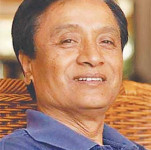
We use Google Cloud Translation Services. Google requires we provide the following disclaimer relating to use of this service:
This service may contain translations powered by Google. Google disclaims all warranties related to the translations, expressed or implied, including any warranties of accuracy, reliability, and any implied warranties of merchantability, fitness for a particular purpose, and noninfringement.

Highlights
- Until today, Nepali people continue to suffer - lack of honesty in party politics, criminal behavior under political cover, lack of integrity in principles, values, beliefs. Will it be treated only by amending the constitution?



Once again, national politics has heated up, with the issue of constitutional amendment. However, voices of dissent and opposition to the current constitution have been vocal since its inception. Madhesi and tribal communities are still not accepting it.

They wanted a radical change in it from the beginning. There was a time like this, Terai residents considered the moment of promulgation of the constitution to be a dark day, similar violent protests were also seen. At present, the situation is not like that. This does not mean that the issue they have been raising regarding the amendment of the constitution has been dissolved.
The funny thing is, yesterday when the constitution was in force, the same political party that created a commotion as if a big victory was won, is now looking for a reason saying that the articles and clauses of the constitution are wrong and they should be corrected. During the constitutional development, seven constitutions were made from 2004 to 2072. It is too burdensome for a small and poor country like Nepal. But we did not succeed in giving perfection. The reason is the liberal tendency of the constitution makers, disrespect for public sentiment, non-inclusive thinking, ad hoc thinking and lack of vision.
It is clearly mentioned in the preamble what were the political cornerstones and guiding principles of the current constitution. Various people's revolts, democratic movements, armed revolutions, tribal tribes and Madhesh struggle for the end of feudal and unitary government system are the background of constitution making. In addition to the twelve-point agreement, peace agreement, interim constitution, the Constituent Assembly, the report of the state restructuring committee, the recommendations of the state restructuring high-level commission, bilateral and multilateral agreements with the then government and the agitating parties were the main basis and commitments of the current constitution. But in addition to the irresponsibility, short-sightedness of the political circle, they were all based on deception and dishonesty. Another constitution was not expected only for those who wanted to replace a constitution that had a
. In particular, the constitution had to be written in a new vein for the complete liberation and empowerment of the areas, neglected classes and communities that have been discriminated against by the state for a long time. It is a search for the constitutional guarantee of the presence of those communities and classes in all decision-making processes and levels of the state. In particular, the Madheshi, Dalit and tribal communities have raised identity, representation and access as basic questions. But the framers of the constitution ignored all these aspects. He prepared a very wrong commentary on issues like identity. And preferred to call it ethnic, communal. The Madhesi issue was always considered to be abandoned under the false cover of regionalism and narrowness. In relation to the Dalit class, rather than their self-esteem and rights, the matter of dealing with this community was made as a matter of mercy, love, and compassion of the dominant class and community. In order to build an equitable society, everyone's participation and proportional inclusion were limited to using vocabulary only.
Socialism is proclaimed as the goal of the state. But the economic and social welfare policies followed by the government are oriented towards the interests of the broker capitalists. The gap between inequality and poverty is terrifying. The constitution has accepted some basic rights as fundamental rights for the citizens, but the state does not provide any guarantees regarding education, health, employment etc. In this sense the promises of fundamental rights are also meaningless.
As the proposals for constitutional amendment are coming from the top level of the ruling political parties, not only the common citizens remember the role they played in the past during the constitution making, but they are also suspecting many things in the background of their behavior yesterday. The existence of only two parties in the parliament, unfair representation in inclusiveness and proportionality, displacement of federalism, state based on religion, democracy with a king are now in the spotlight. Naturally, there are counter-questions - what is the amendment of the constitution for? However, the provision in the current constitution also deems it desirable to review the constitution within a decade of its promulgation. In a sense, such provisions are considered positive for constitutional dynamism and reform. Even experts are in favor of it. But backward or forward?
If the political circles are trying to raise the bar for the amendment of the constitution, then first of all, things that have been agreed upon in the disbanded Constituent Assembly, from the issue of state restructuring to other matters, should be accepted unconditionally. Another basic condition is the advance confirmation of the provisions, articles, sub-articles of the constitution that are sought to be quoted. The amendment, correction or transformation of a document that is very sensitive and can have a long-term impact, such as the constitution, should not be limited only to the parties present in the legislature. Concerned communities, classes and regions also need adequate opportunities to register their opinions and ideas.
In this way, the journey from one constitution to another is not making the country and the people a political laboratory? The question arises. As time goes on, many complications are found in their practical implementation than in the provisions within the constitution. Constitutional values, beliefs and sentiments on one side and party interests on the other. In ground reality now these two things are developing as divided poles. Unexpectedly, the supremacy of the Constitution was slipping away due to the belief inherent in the parties that it should become a protective shield for their workers. Impunity flourished in the behavior developed in the parties when power and power were given priority. The belief that the parties professed in their documents and their views on the constitution eventually proved to be hypocrisy. This made the parties prosperous and strong or not, history will decide tomorrow, but the current constitution, which was prepared with the strength of struggle, people's movement and sacrifice, was deemed ineffective.
has been repeated many times in the history of the party. Such is the experience from seven years to seventy-two years. On the one hand, insensitivity of parties to constitutional provisions and values, recognition, fraud and fragmentation, on the other hand, dominance and influence of activists over legislation under the guise of party affiliation. These are the reasons for disgust towards the state system itself. But the expectation of the citizens today is the complete end of such situations. Until today, Nepali people continue to suffer - lack of honesty in party politics, criminal behavior under political cover, lack of integrity in principles, values, beliefs. Will it be treated only by amending the constitution? Based on the political circle and the trends seen within it, we can say that the main issue is not only the amendment of the constitution, but the solution is not going to come out of it. If the
agreement is reached, we are trying to amend the constitution. However, in addition to other theoretical principles, there should be a mandatory code of conduct for the purification of the tendencies and conduct of the party and its leaders-activists in the future constitution. Hypocritical behavior on political values, beliefs, and beliefs should be made punishable. Criminal protection under the guise of party politics should be an illegal contract. Common people basically want good governance. They yearn to see the effectiveness of legislation, constitutional supremacy as well as the end of party narrowness and party slavery.
 प्रकाशित : आश्विन ३, २०८१ ०७:३३
प्रकाशित : आश्विन ३, २०८१ ०७:३३

 २३.१२°C काठमाडौं
२३.१२°C काठमाडौं










